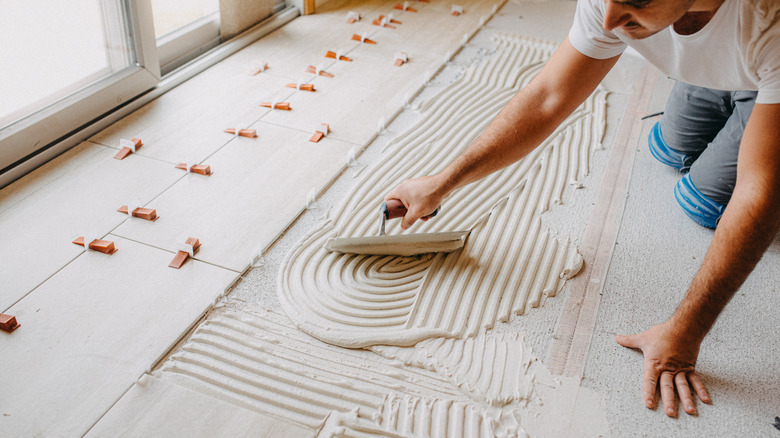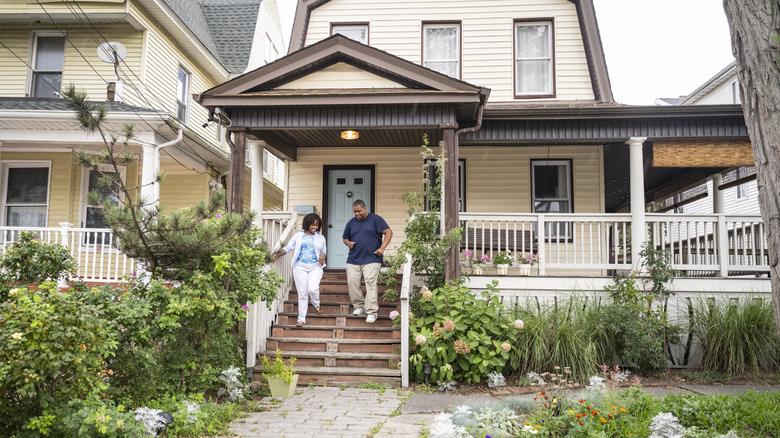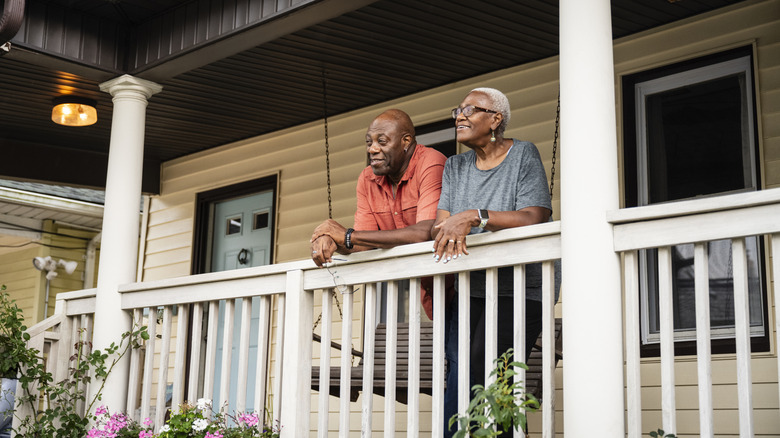12 Items Retirees Will Instantly Regret Buying
Retirement lifestyles are built and demolished on the backs of purchasing decisions. Retirement is a numbers game, through and through. You'll spend your entire working life saving so that your investments can replace your income. Then once you retire you'll need to take steps to ensure that the income-generating principal remains intact, keeping your finances solvent throughout the remainder of your life. The amount you need saved to retire will vary depending on a number of key factors, but the American public generally believes that people need about $1.5 million saved in order to retire comfortably.
But comfortability is dependent not only on how much you have saved, but also how you leverage those resources throughout your golden years. Retirees who splurge in the early days of their work-less lifestyle may find that they need to tighten their belts later on to keep up with routine expenses like groceries and the electricity bill. It's also entirely possible to live "too frugally" in a sense, watching your expenditures so closely that you leave a huge investment account balance behind to your loved ones without ever spending much on yourself. Unfortunately, it's far easier to overextend, and plenty of temptations exit out there in the world. These are some of the most important splurge purchases that retirees should seriously aim to avoid. They won't provide the lifestyle enhancement you'll hope for, and largely serve only to drain your finances and introduce stress during this important time.
Additional life insurance products
Life insurance can be a valuable financial tool across varying stages of life. Burial insurance, for example, is often packaged as a life insurance product and helps elderly Americans minimize the cost of Funeral arrangements (but may impact SSI benefit eligibility if you aren't careful). But the biggest beneficiary of life insurance coverage has to be younger workers who are looking to protect their families. Term life insurance is a common product that people invest in as a backstop to prevent their spouse and children from falling on hard times in the event of an accident or terminal medical diagnosis. Term policies are cheaper than whole life insurance and they expire at a set point in the future. This allows a person to take out life insurance to cover for a specific period of time in their life, perhaps for the 18 or 20 years that come directly after the birth of a child.
Older Americans don't have nearly as much use for a life insurance policy (frequently making new policies a waste of money). These financial instruments certainly can provide value to the loved ones they'll leave behind, and so it's inappropriate to suggest that life insurance is not worth it for older Americans as a blanket statement. However, policies for those who are objectively closer to death than others based solely on actuarial tables and life expectancy metrics should anticipate a much more expensive policy, potentially prohibitively so.
Unnecessary home renovations
Renovating your home is also a potentially fraught decision. Renovating in order to improve the comfort level you experience it isn't necessarily a bad idea. Older Americans can get great value out of targeted home improvement projects, but retirees will need to be careful when exploring renovation options. These kinds of decisions are all about generating value. While on a fixed income in retirement, the only way to finance a big project may be to tap into a home equity loan or some other kind of mortgage-related financing. Pulling equity out of your home in order to introduce new amenities may be useful if you are gearing up to sell the property and are targeting value-infusing upgrades. But retirees can open themselves up to financial vulnerability by investing substantially in their home simply for the sake of personal use.
Large scale home improvement projects that won't deliver decades of value are often expenditures that don't make sense for retired people. There's simply too much you have to trade away in order to gain access to these kinds of changes. Instead, retired people should focus on small scale improvements that enhance the comfort and lifestyle that a property can deliver.
Expensive cars and other extravagant vehicles
Expensive cars are almost always a bad idea for retirees. Car buying is frequently a process that involves the assistance of financing products. In 2024, 80% of new cars and 36% of used vehicles sold in the U.S. were bought with financing. This is a trend that has remained largely stable over the years. As someone on a fixed income, you're more than likely to fall into this category, as well.
The more expensive your monthly payment for a new car is the less capital you'll have available for other important purchases. The car buying decision is an important one no matter where you find yourself in the game of life. All buyers will have to square a new monthly payment obligation with their existing budgetary constraints and requirements. But those still in the workforce have a bit more flexibility when it comes to making ends meet. Retirees are severely limited when it comes to their financial mobility. Taking a larger distribution can open retirees up to increased tax liabilities in certain circumstances while also creating the potential to nosedive long term financial stability. Whether you're considering investing in a new car, boat, or a recreational vehicle like a camper van or motorcycle, maintaining budget discipline is critically important.
Discretionary spending that requires a credit card
No matter where you find yourself in life, there will always be opportunities and needs to participate in discretionary spending. You'll want to occasionally go see a movie at your local theater, invest in a vacation for yourself, or spend money on a hobby that you enjoy like an annual golf club membership. There's absolutely nothing wrong with budgeting for these kinds of discretionary spending items.
Where retirees run into trouble, however, is when they exceed their budget for this category of spending. It can be a great idea to funnel much or all of your routine purchases through a rewards or cash back credit card, so long as you consistently pay off the entire balance. The trickle of rewards are valuable for people who are working and retirees alike. But if you find yourself falling behind on the payoff portion of this two-sided coin, you may end up paying dearly for the privilege of those limited benefits. It's critically important to budget diligently while you are in the workforce and it's potentially even more essential to maintain strong budgeting habits in retirement. Blowing past your monthly limit through the use of credit card tools, particularly when it comes to discretionary spending is a recipe for disaster.
A top of the line computer
One purchase that many retirees may not be thinking about all that much involves their computer. Most desktop PC units will last at least three years before thoughts of a replacement enter the conversation, while owners can frequently extend the lifespan of their computer to a maximum of about five to eight years. Retirement, on the other hand, is anticipated to last an average of about 20 years (18.6 for men and 21.3 for women). The result is an expectation of two or more computer replacements for those who continue working through routine lifestyle management tasks on a laptop or desktop computer.
These replacement opportunities provide diverging paths for retirees. Many people who have worked in highly technical fields may be accustomed to the fast pace and expanded capabilities of high end processing power. An Intel i7 processor is far superior to the brand's Core i3 offerings, and the same can be said for any other brand that may feature in a computer you're considering. But a retired person no longer needs the advanced capabilities of high tech graphics cards and superior processing power. Many retired people will log on to the computer to file their taxes every year and to manage their investment accounts with limited need comes limited capability requirements that can save you a heap of cash when it comes time to replace your current machine.
A new house that's too large for your needs
Retirees may seek to stay in their home for as long as possible, or they might consider a move that allows them to downsize. As life continues to march forward, the demands of the typical lifestyle change, and this can often lead people to contemplate a change of scenery that gives them a different kind of living experience. A retiree living in a large home might consider selling their property and moving into a smaller house in a more convenient location or with a nicer view.
One thing retirees shouldn't generally do is upsize. Unless there's some specific reason in your life to move into a larger home, you're likely to only find yourself throwing away money by buying something that's more expensive and provides increased square footage. As is the case with younger workers, retirees can easily find themselves in the category of "house poor" if they invest too much of their monthly income into a new mortgage payment. During this period of life, remaining smart with housing costs is crucially important.
A vacation home
Another kind of property that retirees should be hesitant to invest in is a second living space aimed at serving as a vacation property. Everyone's lifestyle and financial circumstances will be their own, but most people won't see the kind of benefit they hope for by investing in a vacation home. Retirees often find that they need to stay closer to home in order to spend time with family members or to visit their doctor on an increased schedule. Similarly, many older Americans eventually discover that they no longer have the wherewithal to get on a plane and sit for hours at a time or make the lengthy drive to the vacation home they might have purchased in a different city or state.
The sad reality is that vacation properties will ultimately end up sitting idle for many retired purchasers. This might happen quickly or slowly, but the end result is frequently the same. As a work around for this, many people might consider investing in a timeshare, but this is perhaps an even worse decision. Timeshares can operate with archaic and inflexible usage rules and some even sell with stipulations that the payment obligation survives the death of its original owner and becomes an obligation to their next of kin.
Regular meals out at restaurants
Once you hit retirement you might look to enhance some aspects of your lifestyle because you now have far more free time. Some retirees double down on their fitness while others engage in brand new hobbies that bring joy to their lives. No matter what you choose to spend your time doing, there are a few financial realities that don't change alongside your new schedule and lifestyle. One of these is the fact that eating out at restaurants remains an unnecessary splurge expense. People who work long hours can often justify the expense to themselves by considering a restaurant meal to be a socializing event or a tradeoff that allows them to save time rather than money.
But once you leave the workforce, neither of these justifications remain particularly viable. You have plenty of time to socialize with friends and family as someone who no longer needs to worry about the demands of a busy work schedule. And time is your greatest asset, allowing you to worry far less about cramming an evening routine into a few hours before heading off to bed ahead of another busy day in the office. Restaurants are well known as some of the highest markup artists in the entire consumer marketplace. It's perfectly fine use of your money to go out to eat every once in a while, but frequent trips to local restaurants can quickly become a massive hindrance to your financial wellbeing.
Paying off adult children's debt or cosigning on their new lending needs
Parents routinely make sacrifices to improve the lives of their children. Everyone wants to see their children thrive and enjoy life to its fullest. In many cases, parents will offer financial support to their children long into their own adult years. Helping an adult child isn't necessarily a poor financial decision, but it is one that can place additional vulnerabilities and burdens on a retired person working with a fixed income.
Retirees have far less flexibility when it comes to making large purchases, and the same goes for gifting or loaning significant sums of money to loved ones. This money has to come from somewhere, and in the case of a retiree it's likely that it will be drawn directly from their investment portfolio. Helping to support the aspirations of your children is a noble venture, but it can be detrimental to your own finances. There comes a time when everyone will need to stand on their own, and cannibalizing your future to help pay for your adult child's financial needs is frequently a very bad idea. The same can be said for cosigning on a mortgage or some other kind of lending product they're hoping to secure. Placing this obligation on your shoulders can severely backfire and leave you holding the bag.
Risky investment opportunities
Retirees who have spent their adult life saving and investing for these golden years will likely be adept at finding good investment opportunities to protect and grow their principal. Just because you've left the workforce and have transitioned into withdrawal rather than deposit as a primary retirement account interaction doesn't mean you've completed your investment journey. The money you have in your retirement accounts and perhaps even cash you receive from other resources like Social Security checks or rental income can and should still be invested and routinely rebalanced to support your ongoing endeavors and lifestyle needs.
But the risk tolerance that a retired person takes on is completely different than that of an early-career investor. Younger investors can afford to introduce far more risk to their portfolio. With greater risk comes greater upside and the additional years allow for recovery if an investment turns sour. Retirees need to be careful about value defense as they continue to explore the investment marketplace. Losing money in retirement can lead to significant retractions in usable capital whereas the same loss of value for a thirty-something is only a blip in a much longer timeline.
Full-priced gym memberships (and other, similar non-discounted services)
Many retirees will be interested in maintaining an active lifestyle once they leave the workforce. People who have spent their entire lives engaged in sports or general fitness will frequently look to continue their gym membership and other activities. Whether you're a golfer, tennis player, runner, or simply someone who likes to workout at the gym a few days per week, You're likely to be routinely spending money on memberships and other purchases to stay active.
As a senior, however, you don't need to pay full price for many of these expenses. Senior discounts exist all across the marketplace, from apparel stores to golf clubs and gyms. As is the case with just about any other spending category, paying more than you have to for the same experience or good is simply a waste of money that can be elsewhere in your financial life. It may not seem like much, but even a $10 discount here can be redirected to covering something like a subscription service elsewhere. These discounts add up, and after you've combed through the budget and found areas that can be trimmed simply by engaging your senior discount you may be shocked to find that you have substantially higher amount of free cash left over.
Paying for storage unit space
Storage units are yet another expense that retirees should seek to eliminate from their monthly budget. Storage units offer value to a variety of consumers. People who run small businesses may need an offsite storage facility to maintain a reserve of products or components, while those who have recently moved may rely on storage facility to keep some of their belongings safe and out of the way as they organize their life in a new property. Others might consider renting a storage unit in order to secure large pieces of furniture that have been in their family for many years or as a means to get some of their adult children's belongings out of their home.
But the reality is that the price of storage units has only been skyrocketing in recent years, and it's become financially unsound for many people to sink cash in this product. Those existing on a fixed income simply don't need this added expense. Moreover, anything you might have in your storage unit as a retired person is frequently something that could be sold at a garage sale and not missed or gifted to someone else in the family and loved in their home rather than stored away out of sight. Finally, if you're paying for a storage unit so that you can hold on to your children's belongings, you're throwing away money to store memories that might fit in your attic or, better yet, their own home.












